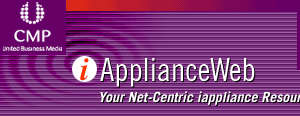



 |
 |
|
|
 |

|
||
|
|
|
|
|||

|
Server I/O Competiors Battle For Interconnect LeadBy Rick Merritt, EET San Jose, Calif. - Backers of five different emerging interconnect specifications expressed little agreement as they stated their cases at the Communications Design Conference here Tuesday (Sept. 24). Proponents of HyperTransport, Infiniband, PCI-X, PCI Express and RapidIO insisted they were gaining traction with communications OEMs and had rock solid road maps. "I understand some communications OEMs are on the fence between using HyperTransport and RapidIO," said Gabriele Sartori, president of the Hypertransport Consortium. "International Data Corp. recently did a study for us which we will release soon which shows there will be multiple tens of million of HyperTransport chips sold in the next couple years and hundreds of millions over the next five years," Sartori said. "We will be announcing a few new members of our consortium soon, including at least one in comms." Sartori also said the anticipated HyperTransport 2 spec would boost data rates to nearly 5 Gbytes/second, almost a threefold improvement over the standard's 1.6 Gbytes/s data rate of today. "We have a lot of head room in front of us," he said. Infiniband, at 10 Gbits/s, is being designed into many I/O chassis products linked to data center servers. Infiniband will also be used in telecom servers based on the Advanced TCA form factor specified by the PCI Industrial Computer Manufacturers Group's (PICMG) 3.2 standard, which should be finished by the end of the year, according to Kevin Deierling, vice president of product marketing for Mellanox Technologies (Santa Clara, Calif.). "Obviously new technologies are hard to sell to anyone in this market," he said. The PCI-X interconnect is now shipping in volumes of several million slots a quarter, said Kimball Brown, vice president of business development for ServerWorks Inc. (Santa Clara) "We're really just leveraging the big numbers in computing," Brown said. The so-called advanced switching (AS) capabilities of PCI Express are still in an early definition phase, according to Pranav Mehta of Intel Corp.'s embedded group, which is spearheading that work. "In the last six months there has been tremendous interest from comms OEMs in AS," he said. As for RapidIO, "We're seeing a pretty heavy involvement from the wireless space," said Dan Bouvier, vice president of the steering committee for the RapidIO Trade Association. Nokia recently joined the association, which includes Alcatel, Ericsson, Lucent, Motorola and Nortel as members. "One area we just stumbled on is replacing proprietary interconnects developed for homegrown ASICs," Bouvier added. Deliberate pace While a move to 5- and 10-Gbit/s data rates for the serial and parallel versions of RapidIO is under discussion, migration will be paced, Bouvier said. "One thing that we will be trying to do is not move too quickly to the next data rates. For example, we've stopped at 3.125 Gbits/s for the serial spec at this point," Bouvier said. Deierling of Mellanox was adamant that Gigabit Ethernet will not overtake Infiniband in data center networking even with special TCP offload accelerators in the wings. "Some people are taking a hard problem that brings a big Pentium 4 and brings it to its knees and shifting it to a big embedded processor and bringing that to its knees. With 10G Ethernet the problem just gets 10 times bigger," he said. Bouvier of RapidIO agreed. "We would have to instantiate a DSP core just to handle the Ethernet stack," he said. Brown of ServerWorks, a part of Broadcom Corp., took the opposite position. "If you can make Ethernet work, it all goes to Ethernet. If you can fix it in hardware, you don't have to change the mountain of existing [interconnect] software, and that's huge," he said. Mehta of Intel concluded the panel discussion on a conciliatory note. "Having this many interconnects at this stage is a healthy thing. We push each other to be better. Over time perhaps only two or three of them will survive. In the meantime, these debates are a healthy thing," he said. |
|
||||||||

Terms and Conditions Privacy Statement |
||||||||||